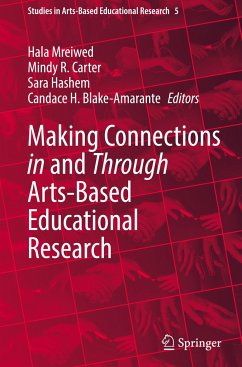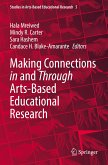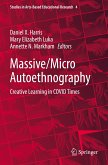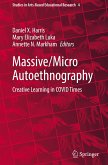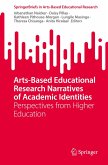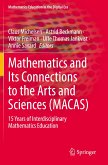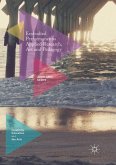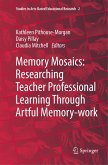Making Connections in and Through Arts-Based Educational Research
Herausgegeben:Mreiwed, Hala; Carter, Mindy R.; Hashem, Sara; Blake-Amarante, Candace H.
Making Connections in and Through Arts-Based Educational Research
Herausgegeben:Mreiwed, Hala; Carter, Mindy R.; Hashem, Sara; Blake-Amarante, Candace H.
- Gebundenes Buch
- Merkliste
- Auf die Merkliste
- Bewerten Bewerten
- Teilen
- Produkt teilen
- Produkterinnerung
- Produkterinnerung
This book explores the connections made in and through arts-based educational research through four themes: socially engaged connections, cultural connections, personal and pedagogical connections, and making connections during the COVID-19 pandemic. It emerges from the 3rd bi-annual 2020 Artful Inquiry Research Group symposium on the theme of "connections". The symposium brought together artists, community members, teachers, students, and researchers through a virtual platform to examine the way(s) in which the arts can help connect people, ideas, and spaces/places in a pandemic reality. Art…mehr
Andere Kunden interessierten sich auch für
![Making Connections in and Through Arts-Based Educational Research Making Connections in and Through Arts-Based Educational Research]() Making Connections in and Through Arts-Based Educational Research116,99 €
Making Connections in and Through Arts-Based Educational Research116,99 €![Massive/Micro Autoethnography Massive/Micro Autoethnography]() Massive/Micro Autoethnography108,99 €
Massive/Micro Autoethnography108,99 €![Massive/Micro Autoethnography Massive/Micro Autoethnography]() Massive/Micro Autoethnography108,99 €
Massive/Micro Autoethnography108,99 €![Arts-Based Educational Research Narratives of Academic Identities Arts-Based Educational Research Narratives of Academic Identities]() Arts-Based Educational Research Narratives of Academic Identities39,99 €
Arts-Based Educational Research Narratives of Academic Identities39,99 €![Mathematics and Its Connections to the Arts and Sciences (MACAS) Mathematics and Its Connections to the Arts and Sciences (MACAS)]() Mathematics and Its Connections to the Arts and Sciences (MACAS)123,99 €
Mathematics and Its Connections to the Arts and Sciences (MACAS)123,99 €![Embodied Performance as Applied Research, Art and Pedagogy Embodied Performance as Applied Research, Art and Pedagogy]() Julie-Ann ScottEmbodied Performance as Applied Research, Art and Pedagogy93,99 €
Julie-Ann ScottEmbodied Performance as Applied Research, Art and Pedagogy93,99 €![Memory Mosaics: Researching Teacher Professional Learning Through Artful Memory-work Memory Mosaics: Researching Teacher Professional Learning Through Artful Memory-work]() Memory Mosaics: Researching Teacher Professional Learning Through Artful Memory-work77,99 €
Memory Mosaics: Researching Teacher Professional Learning Through Artful Memory-work77,99 €-
-
-
This book explores the connections made in and through arts-based educational research through four themes: socially engaged connections, cultural connections, personal and pedagogical connections, and making connections during the COVID-19 pandemic. It emerges from the 3rd bi-annual 2020 Artful Inquiry Research Group symposium on the theme of "connections". The symposium brought together artists, community members, teachers, students, and researchers through a virtual platform to examine the way(s) in which the arts can help connect people, ideas, and spaces/places in a pandemic reality.
Art plays a predominant role in each chapter as authors weave their research and art-based understandings together. This book is a valuable teaching resource for undergraduate and postgraduate courses in teaching, anthropology, digital ethnography, autoethnography, cultural studies, and communications. It is of interest to higher education students, academic researchers, and teachers exploring arts-based methodologies in the fields of creative practice and creativity studies, communications, critical studies, sociology, sciences, teacher education, and the arts.
Art plays a predominant role in each chapter as authors weave their research and art-based understandings together. This book is a valuable teaching resource for undergraduate and postgraduate courses in teaching, anthropology, digital ethnography, autoethnography, cultural studies, and communications. It is of interest to higher education students, academic researchers, and teachers exploring arts-based methodologies in the fields of creative practice and creativity studies, communications, critical studies, sociology, sciences, teacher education, and the arts.
Produktdetails
- Produktdetails
- Studies in Arts-Based Educational Research 5
- Verlag: Springer / Springer Nature Singapore / Springer, Berlin
- Artikelnr. des Verlages: 978-981-19-8027-5
- 1st edition 2023
- Seitenzahl: 304
- Erscheinungstermin: 19. Februar 2023
- Englisch
- Abmessung: 241mm x 160mm x 22mm
- Gewicht: 623g
- ISBN-13: 9789811980275
- ISBN-10: 9811980276
- Artikelnr.: 66015108
- Herstellerkennzeichnung Die Herstellerinformationen sind derzeit nicht verfügbar.
- Studies in Arts-Based Educational Research 5
- Verlag: Springer / Springer Nature Singapore / Springer, Berlin
- Artikelnr. des Verlages: 978-981-19-8027-5
- 1st edition 2023
- Seitenzahl: 304
- Erscheinungstermin: 19. Februar 2023
- Englisch
- Abmessung: 241mm x 160mm x 22mm
- Gewicht: 623g
- ISBN-13: 9789811980275
- ISBN-10: 9811980276
- Artikelnr.: 66015108
- Herstellerkennzeichnung Die Herstellerinformationen sind derzeit nicht verfügbar.
Hala Mreiwed, PhD is an Assistant Professor in Childhood and Youth Studies (CYS) at King's University College at Western. Her research interests in children's rights, impact of war-trauma on education, teacher education and training, community-building within classrooms, children's media and creative drama come from her experiences in Canada and abroad. She is the recipient of several awards including the P. Lantz Fellowship for Excellence in Education and the Arts (2015), the Outstanding Leadership & Service Graduate Award (2019) from McGill University, and the FRQSC Doctoral research scholarship (2017-2020). Mreiwed is currently Vice-Chair of the Canadian Coalition for the Rights of Children (CCRC), Children's Rights Advisor to the Centre for Research-Action on Race Relations (CRARR), and Co-President of the Canadian Association for Curriculum Studies (CACS). Her most recent co-edited book is Art as an Agent for Social Change (2021) by Brill Sense. Mindy R. Carter, PhD is an Associate Professor and Director of Teacher Education Programs in the Department of Integrated Studies in Education at McGill University (Faculty of Education). Carter's SSHRC, MEES and FRQSC funded research focuses on using drama and theatre education to explore critical societal issues, teacher agency and curriculum through arts-based educational research. Carter is the (2021) recipient of the ARTS publication award through the Canadian Society for the Study of Education (CSSE) and the (2022) Mentorship award winner from CSSE. Carter's latest book Smallest circles first: Exploring reconciliatory praxis through drama education was released Spring 2022 by the University of Toronto Press. Sara Hashem, PhD is the co-founder of the Artful Inquiry Research Group (AIRG) at McGill University. She is an educator and a museum specialist with extensive international experience in educational programming and museum development. She currently holds the position of Pedagogical Advisor for Curriculum and Faculty Development at Champlain College Saint-Lambert. She is also a Lecturer in the Department of Integrated Studies in Education at McGill University (Faculty of Education). Academically, her work is grounded in arts-based educational research methods, museum studies, teacher education, technology in education, curriculum studies, arts education, and arts leadership. Candace H. Blake-Amarante, PhD is is the Knowledge Manager at Equitas-Centre international d'éducation aux droits humains, International Centre for Human Rights Education. She is an artist-researcher, who specializes in writing children's stories and plays. In most of her stories, she pursues two main goals: bringing awareness of children's rights through the arts and incorporating, in children's literature, the voice of children with chronic illnesses. Her most recent work includes: a dialogue, "Let's not talk about it anymore" (Questions: Philosophy for Young People forthcoming Fall 2022); a children's book, The Dream Machine (in collaboration with Dr. Argerie Tsimicalis and Shriners Hospitals for Children-Canada; Tellwell Publishing, forthcoming); a children's poem, "The Sky Smiles at Me" (LEARN Quebec, My Goodnight Bag 2021); a play on children's rights, The Ugly Ones (with Chelsea Woolley; Staged Reading Geordie Theatre Fest 2020); and a play for young audiences, You, Me and Victor Hugo! on the concept of censorship (Artist Mentorship Program at the Black Theatre Workshop 2018-19). She has published a short children's story, The Blunder Family: Now Where'd I Put the Pork? (East of the Web 2020), and a children's book, The Pheasant's Tale or ... Was it its Tail? (Green Bamboo Publishing 2017). Amarante holds a PhD in political science from Columbia University, NY. Currently, she is a member of the Board of Directors of the Canadian Coalition for the Rights of Children.
Chapter 1: Introduction.- Chapter 2: Re-storying Immigrant Seniors During COVID Through a Lens of Narrative Inquiry.- Chapter 3: Shifting Work and Home Spatialities: Connecting in and through Arts-Based Research during the COVID-19 Pandemic.- Chapter 4: Connected Across Distance: Creating and Sustaining Collegial Collaboration Through Arts-Based Educational Research .- Chapter 5: On recruiting Aesthetic Experience: A Trio-Ethnography of the Affordances and Limitations of Teaching (with) the Arts and Literature in a Pandemic year.- Chapter 6: [Performing] Connection in the Classroom during COVID-19: An Ethnodrama on Virtual Synchronous Education.- Chapter 7: Connecting Community: Rural Girls Using an Arts-Based Digital Dialogue Tool to
Address Gender-Based Violence.- Chapter 8: Hope Stories of the Arts and School-wide Change.- Chapter 9: The #StopAsianHate Movement: Deconstructing Asian Hate through Digital-Visual Approach and Letter Writing.- Chapter 10: Re-imagine Connections with Natural Environment Through Socially Engaged Art.- Chapter 11: Feminist Aesthetics, Intertwined Indigenous and Immigrant Life Narratives and Teaching Practises.- Chapter 12: Storytelling through Textiles: The Re-birth of a Phoenix Called Damascus.- Chapter 13: Inhabiting/Living Practice: An Emergent Collaborative Arts-Based Exhibition.- Chapter 14: Inclusion as Folded Choreo-Writing.- Chapter 15: Hold onto your hat! All aboard for the train called fiction no fiction!.- Chapter 16: A/r/tographic Inquiry: When Art Meets Text.- Chapter 17: Polyvocal Poetic Play Through Self-Study Research: Challenging the Status Quo to Improve Professional Practice.- Chapter 18: Using Arts-Based Educational Research to Interrogate Learning in Cohorts: Shifting Dynamics and Repairing Disrupted Relationships.- Chapter 19: Synchronicities and Tensions In and Outsideof Elementary Classrooms: Perspectives on Building Collaborative, Artful Experiences.- Chapter 20: The Power of Photo-Elicitation in Promoting Conversations About Unfamiliar Topics.
Address Gender-Based Violence.- Chapter 8: Hope Stories of the Arts and School-wide Change.- Chapter 9: The #StopAsianHate Movement: Deconstructing Asian Hate through Digital-Visual Approach and Letter Writing.- Chapter 10: Re-imagine Connections with Natural Environment Through Socially Engaged Art.- Chapter 11: Feminist Aesthetics, Intertwined Indigenous and Immigrant Life Narratives and Teaching Practises.- Chapter 12: Storytelling through Textiles: The Re-birth of a Phoenix Called Damascus.- Chapter 13: Inhabiting/Living Practice: An Emergent Collaborative Arts-Based Exhibition.- Chapter 14: Inclusion as Folded Choreo-Writing.- Chapter 15: Hold onto your hat! All aboard for the train called fiction no fiction!.- Chapter 16: A/r/tographic Inquiry: When Art Meets Text.- Chapter 17: Polyvocal Poetic Play Through Self-Study Research: Challenging the Status Quo to Improve Professional Practice.- Chapter 18: Using Arts-Based Educational Research to Interrogate Learning in Cohorts: Shifting Dynamics and Repairing Disrupted Relationships.- Chapter 19: Synchronicities and Tensions In and Outsideof Elementary Classrooms: Perspectives on Building Collaborative, Artful Experiences.- Chapter 20: The Power of Photo-Elicitation in Promoting Conversations About Unfamiliar Topics.
Chapter 1: Introduction.- Chapter 2: Re-storying Immigrant Seniors During COVID Through a Lens of Narrative Inquiry.- Chapter 3: Shifting Work and Home Spatialities: Connecting in and through Arts-Based Research during the COVID-19 Pandemic.- Chapter 4: Connected Across Distance: Creating and Sustaining Collegial Collaboration Through Arts-Based Educational Research .- Chapter 5: On recruiting Aesthetic Experience: A Trio-Ethnography of the Affordances and Limitations of Teaching (with) the Arts and Literature in a Pandemic year.- Chapter 6: [Performing] Connection in the Classroom during COVID-19: An Ethnodrama on Virtual Synchronous Education.- Chapter 7: Connecting Community: Rural Girls Using an Arts-Based Digital Dialogue Tool to
Address Gender-Based Violence.- Chapter 8: Hope Stories of the Arts and School-wide Change.- Chapter 9: The #StopAsianHate Movement: Deconstructing Asian Hate through Digital-Visual Approach and Letter Writing.- Chapter 10: Re-imagine Connections with Natural Environment Through Socially Engaged Art.- Chapter 11: Feminist Aesthetics, Intertwined Indigenous and Immigrant Life Narratives and Teaching Practises.- Chapter 12: Storytelling through Textiles: The Re-birth of a Phoenix Called Damascus.- Chapter 13: Inhabiting/Living Practice: An Emergent Collaborative Arts-Based Exhibition.- Chapter 14: Inclusion as Folded Choreo-Writing.- Chapter 15: Hold onto your hat! All aboard for the train called fiction no fiction!.- Chapter 16: A/r/tographic Inquiry: When Art Meets Text.- Chapter 17: Polyvocal Poetic Play Through Self-Study Research: Challenging the Status Quo to Improve Professional Practice.- Chapter 18: Using Arts-Based Educational Research to Interrogate Learning in Cohorts: Shifting Dynamics and Repairing Disrupted Relationships.- Chapter 19: Synchronicities and Tensions In and Outsideof Elementary Classrooms: Perspectives on Building Collaborative, Artful Experiences.- Chapter 20: The Power of Photo-Elicitation in Promoting Conversations About Unfamiliar Topics.
Address Gender-Based Violence.- Chapter 8: Hope Stories of the Arts and School-wide Change.- Chapter 9: The #StopAsianHate Movement: Deconstructing Asian Hate through Digital-Visual Approach and Letter Writing.- Chapter 10: Re-imagine Connections with Natural Environment Through Socially Engaged Art.- Chapter 11: Feminist Aesthetics, Intertwined Indigenous and Immigrant Life Narratives and Teaching Practises.- Chapter 12: Storytelling through Textiles: The Re-birth of a Phoenix Called Damascus.- Chapter 13: Inhabiting/Living Practice: An Emergent Collaborative Arts-Based Exhibition.- Chapter 14: Inclusion as Folded Choreo-Writing.- Chapter 15: Hold onto your hat! All aboard for the train called fiction no fiction!.- Chapter 16: A/r/tographic Inquiry: When Art Meets Text.- Chapter 17: Polyvocal Poetic Play Through Self-Study Research: Challenging the Status Quo to Improve Professional Practice.- Chapter 18: Using Arts-Based Educational Research to Interrogate Learning in Cohorts: Shifting Dynamics and Repairing Disrupted Relationships.- Chapter 19: Synchronicities and Tensions In and Outsideof Elementary Classrooms: Perspectives on Building Collaborative, Artful Experiences.- Chapter 20: The Power of Photo-Elicitation in Promoting Conversations About Unfamiliar Topics.

